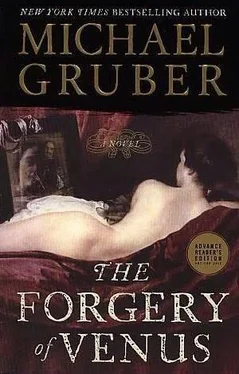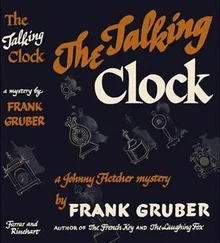And I said, “Does that mean I’m getting paid?”
He said, “Absolutely, the check’s in my account as we speak. But listen, Chaz, this is just like the very beginning. Two hundred grand is chump change compared to what you could be pulling down with the right connections.”
“Bigger ceilings?” I said.
“No, there’re guys here tonight who-” And then he dropped his voice even lower, like there was anyone in the room who could speak English worth a damn, and he asked me, “How would you like to make a million bucks?”
Well, that got my attention. I said, “Who’s going to pay me a million dollars? And for what?”
“Werner Krebs. He’s here. He loves your work.”
And here I thought about what Maurice had said about the guy, he’s shady but loves art, something different from the usual art hag, and different also from a vulgarian semigangster like Castelli, and I decided that despite what Maurice had said, I did want to know him.
So I said, “Okay, let’s go.”
“No, not now-tomorrow. Have you got some decent clothes?”
I said no and asked again what Werner was going to pay me a million dollars for, but he said, “You’ll talk to the man, we’re on for tomorrow. But we need to get you cleaned up.”
He actually bought me an outfit the next morning; we went down to San Marco, Armani for the clothes, shoes at Bottega Veneta, the works, and a barber near the Danieli Hotel who eyed me carefully, like a fresco guy checking a decayed ceiling, and gave me a haircut, face steam, and shave. Then we took the Hotel Cipriani’s private launch over to Giudecca and Krebs’s suite there. Mark had been doing nervous chatter all morning, but when he got onto the boat he clammed up. I thought he was seasick, but in retrospect I think he was just nervous. Or scared.
I was scared too, but not of Krebs.
While we were on the boat it happened again: I was looking out over the lagoon back to the city, enjoying the feeling of being out on the water again and the terrific if overdone view, and I sort of blinked and saw that the Riva degli Schiavoni was crammed with ships, caravels and cogs and lateen-sailed tartans, and the near distance was full of small craft, and there was black smoke making a smudged cloud over the Arsenale. And there was no engine sound anymore, and I’m on a galley, up on the poop under an embroidered awning, and I’m dressed in black with a ruff; there are other similarly dressed men standing around on the deck, and one of them is speaking to me, Don Gilberto de Peralta, the Spanish ambassador’s majordomo, who is serving as my cicerone on this, my first visit to Venice, and we are not heading away from the city but toward it, toward the Molo in front of San Marco, and he’s telling me about the Tintorettos and Veroneses in the Sala del Gran Consiglio. I am staring past him at the glittering pile I can just see through the masts of the ships, my heart soaring in my breast. I can barely believe I am in the city of Titian and the other masters; my eyes are hungry for the sights promised me. And now the galley touches gently against the quay and our party descends and assembles at the gangway; the smoke from censers burning to cover the stench of the slaves below blows heavily across our faces, but we can still smell them, the wretches. There is a delegation waiting for us, for I am traveling with Don Ambrogio Spinola, Marqués de los Balbases, captain-general of the Catholic armies fighting the heretics in the Low Countries, who has been graciously kind to me throughout our voyage from Barcelona. And he steps off first, of course, and then some of his train, and then me, onto the soil of Venice at last.
And I did step onto a pier, but it was the Danieli Hotel’s, and I staggered like a drunk and would’ve fallen if Mark hadn’t grabbed my arm. He said, “Christ, man, you should’ve told me you got seasick. I would’ve slipped you a Dramamine patch.”
“I never get seasick,” I said.
“Then it’s something. You’re white as a sheet. Are you okay to do this?”
I lied that I was fine. I was the last thing from fine; I was thinking, It’s been weeks since I had any salvinorin and now I have a salvinorin trip, and maybe I’ll wake up in the Gorgeous Loft of Terror again and this whole Venice thing will have proved to be another psychotic break, and it was only with difficulty that I was able to put one foot in front of the other and walk with Mark into the lobby of the hotel.
Krebs had taken the Dogaressa suite. Pale, overstuffed furniture, Oriental carpets on the floor, a view through high, narrow windows of the tower of the Doge’s Palace in St. Mark’s. I’ve heard about this place, probably the most expensive room in Venice, three grand a night in euros or something like that, and here was the man himself, trim, dark suit, handmade shoes, five-hundred-dollar tie, a big cigar. He’s got that tanned, slick, plastic skin you only see on really rich men, like a Kewpie doll, smooth, all the blemishes and sags of old age expertly removed-he was over seventy, I knew, but he looked fifteen years younger. Short, silvery hair in a fringe around a bald dome-he must’ve passed on the hair implants. Gave me a look, like a man buying a dog, up and down.
I looked at him the same way: the impression of power, ruthlessness, something you don’t see in your average bond trader, and which I recognized well, having just been in conversation with Captain-General Spinola, back in the seventeenth century. Our eyes met, and a smile formed on his face. A little shock now-he was genuinely glad to see me.
Introductions by Mark, a gentle, dry handshake, not a macho gripper, doesn’t need to, obviously. I saw my old pal Franco was there; I thought he worked for Castelli, but no, unless it’s a loan, like regular people lend tools: here’s my muscle guy and driver, enjoy! We sat deep into the soft couch, he plopped into the armchair opposite, cigars offered, Mark takes one, a Cuban Cohiba, of course; I choose a glass of Dom P. served by Franco, a man of many skills, it seems. Mark starts a little chatter, pleasantries, how was the trip, what a nice room, etc., silenced by a look. He just wants to talk to me.
So-compliments on the Tiepolo, intelligent questions about how we did it, then the talk moves to art, the old masters, who do I like, their virtues and faults. What have I seen in Venice? Not much except Tiepolos, I’ve been busy. A shame, he says, and tells me what’s worth seeing: the Veroneses in the palace, some things at the Franchetti Gallery in the Ca’ D’oro, Titian’s Venus at Her Mirror, don’t miss the paintings in San Sebastiano, a good place to get away from the tourists. We talk about there being no major museums in Venice, because Venice is a museum, the old Venetians didn’t buy pictures from anyone but the local boys, as a rule, and they kept them in their palazzi. He talked about this for a while and seemed to approve of my responses.
I was still a little rocky from my boat ride as Velázquez, but I was feeling the influence of the wine and the flattery. I don’t have much experience with wealthy collectors praising my work and being interested in my views on art, so I was yakking away. The guy knew traditional painting up the ying-yang, just like Maurice described; he seemed to have seen practically every important painting in the world at least once, not only in museums but in all the major private collections too. Encyclopedic, really; he makes even Slotsky look like he just got out of Art History 101.
After a while he raised the subject of Velázquez. He said no one painted like Velázquez, incomparable, not the images so much, but the technique. So I talked about the technique, the palette, the brushwork. I said I thought it was because he didn’t care, he didn’t care about the painting, it wasn’t work to him, his self-worth wasn’t derived from it.
Читать дальше












